A Rosy Picture from Taif - By Eyad Abu Shakra, Asharq Al-Awsat
When Saudi Crown Prince Mohammad bin Salman bin Abdulaziz declared that “We will never return to the post-1979 era”, many who are not familiar with Saudi Arabia, I reckon, did not recognize fully what those words meant.
Well, between the autumn of 1977 and the autumn of 1978 I lived and worked in Saudi Arabia’s Eastern Province; which I loved and loved its people. Then, between early and mid-1979 I lived in the Kingdom’s Western Province, and had a similarly beautiful experience. That period was popularly described as ‘the boom period’.
Later on, I joined Asharq Al-Awsat, from where I have been able, for three and half decades, to follow the developments within the Saudi society, and interact with friends, journalists, businesspeople and decision makers connected - one way or another - with Saudi Arabia. However, I have to admit that throughout, which is now called ‘the Revival period,’ I was following developments there from a distance; geographically speaking!
My long-distance interaction ended in 2013, when I visited Riyadh for the first time since late 1977. The following year I visited Jeddah and Al-Madinah; and since then, I made more visits, the latest being to Taif and Jeddah two weeks ago.
I shall not comment on the ‘the Revival period’, firstly because I did not live through and experience its effects directly; secondly, because I know that Saudi citizens have enough maturity and awareness to make them more qualified to analyze its social phenomena and cultural influences in a political atmosphere poisoned by Iran’s ‘Khomeini revolution’.
Indeed, any talk about the extremism, distortion, aggression, subversion of coexistence and threat to good neighborliness this ‘revolution’ caused is redundant. The atmosphere created by ‘Khomeinism’ was bound to provoke a reaction of similar kind but opposite direction, within a period of redrawing political priorities in the Middle East, and the world at large.
The Middle East was going through the repercussions of the Camp David Accords and Lebanon’s war, while the Muslim world was living the attrition of the Soviets’ ‘Red Army’ in Afghanistan. As for the global scene, the wider world was witnessing how America’s Reaganism and Europe’s Thatcherism were working hand in hand to stifle, and eventually, bring down the USSR.
Surely, it is impossible to hold one side responsible for a global crisis, but the negative outcome soon began to appear, culminating in the attacks of September 11, 2001. At this juncture, a new equation in the new unipolar world order emerged; and after a conquest here and a sectarian conflict there, postulates collapsed, considerations changed, alliances cracked, and the fragility of ideological alternatives became clear for all to see.
Shock treatment after the fall of the USSR has consumed itself, while the religious alternative that enjoyed the ascendancy at the expense of Communism has reached the end of the road as ultra-nationalists and racist populists are finding their voices against the creeping wave of globalization. Even countries built by immigrants have become anti-immigration.
The Arab world has been changing too. ‘Political Islam’ has found itself in a similar fate to nationalism, liberalism, socialism and military rule, before it. Arab youth have discovered that overcoming challenges is never achieved through promises, daydreams, and making religion a refuge for the desperate instead of recognizing it a source of guidance and enlightenment that encourage reason and constructive thought.
Political realism now requires appreciating the vital need for development, diversification of economic resources, and benefitting from foreign experiences in building institutions. No less important, is being aware that it is now impossible live on an isolated ‘cultural island’ when the whole world has become a ‘global village’.
In Saudi Arabia, as well as many Arab and Muslim countries, there are rich human, material and cultural capabilities; ones ripe for investment, in a world that we must comprehend and successfully meet its challenges. This investment is the road back to the pre-1979 normalcy.
Recently, upon my return from Taif, where I enjoyed attending ‘The Taif Season’ and its various events, I had a feeling that cemented what I had felt in my last visit to Riyadh, and what I saw in the city and province of Al-Madinah, including Al-Ula.
With every meeting and discussion, there was a deep sense of optimism, self-confidence, and belief in the ability to achieve anything.
Young men and women, working in various events, were almost all university post-graduates. One of the volunteer drivers that took me around the venues was an engineer. The ‘Rose Village’ looked like a beehive; where young men and young women were busy explaining to the visitors everything they would want to know about roses, scents, types, perfume blends, etc. Shows were impressive and colorful; and the high attendance – of both sexes – was a testimony to the healthy social interaction and strong belief in the future.
Visiting ‘The Crown Prince’s Camel Festival’, I was impressed with the guide at the paintings’ gallery. The confident and knowledgeable young lady, who took me on a tour inside the gallery, holds university degrees from the US. As impressive, was my main guide; a young man whose infectious enthusiasm would give any visitor the impression that the whole event was his. He was explaining with pride how heritage and traditions were merging futuristic technology. I was thrilled to know that a data bank for every camel in the Kingdom has been prepared. This is made possible by planting a microchip in the camel’s neck documenting all its history, physical, ownership, and other details; which would transform what has been a lifestyle feature in Arabia into a fully-fledged industry, as well as sport that is now popular in Australia and Central Asia.
I was not surprised by what I saw in Souq Okaz, the resurrected pre-Islamic old meeting place, emporium and agora. Still, impressive were the ‘reproduction’ sets, literary plays, shows, goods and crafts displayed in the Souq as well as the wings of 11 participating Arab countries. Here too, huge crowds were attracted every evening; although the epitome for me was meeting the Director General of the Taif Season, whose office was at the Souq. The energetic young lady’s first words when she welcomed me into her office were “Welcome, Mr. Eyad, but please, if possible I would appreciate your criticism first…!”
Not far from Taif, I paid Jeddah a one-day visit. There I met dear friends and colleagues, and took a ride in the car of a dear friend, driven by her. It was nothing short of normal, with self-confidence and normalcy all over.
Indeed, everything I saw and heard during my six-day visit reminded me of what I had heard in Dubai more than 15 years ago.
That day, when asked by a colleague about the risks of rapid opening up, a UAE official replied: “My brother; we only fear God and fear itself. We shall never stop our opening up and development just because of our concern about possible problems. All transgressions are dealt with under the rule of law, but we shall never allow fear to tie us down!”
This is the wonderful positive attitude I felt in Taif.
It is the most beautiful and fragrant rose I brought back with me.
Latest News
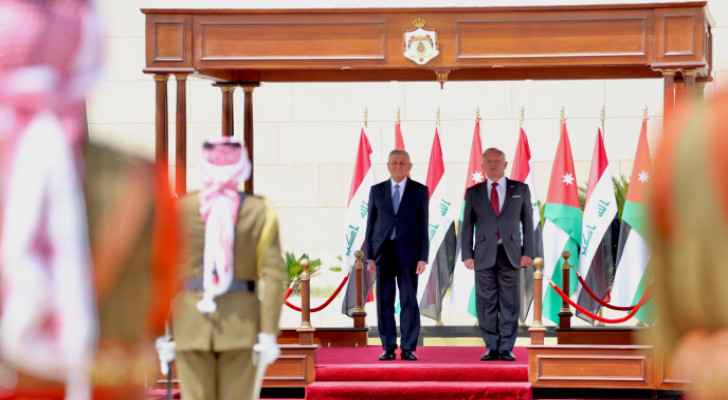 King Abdullah, Iraqi President discuss Gaza in Amman talks
King Abdullah, Iraqi President discuss Gaza in Amman talks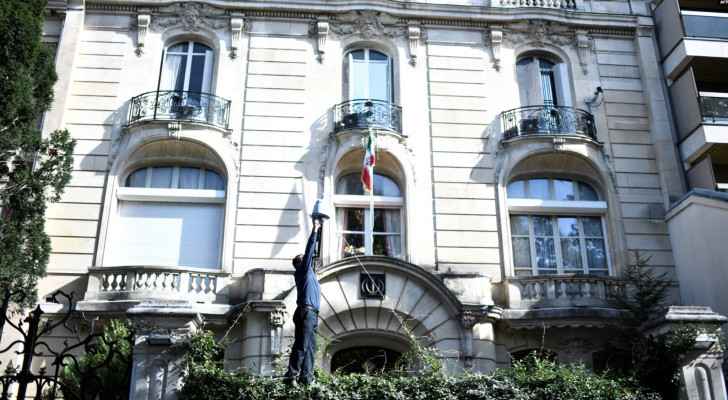 France summons Iranian ambassador over strikes against “Israel”
France summons Iranian ambassador over strikes against “Israel”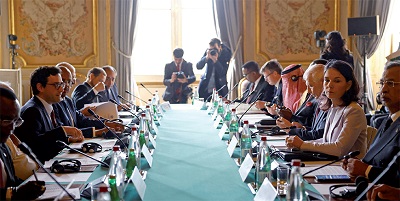 France hosts Sudan talks a year into 'forgotten' war
France hosts Sudan talks a year into 'forgotten' war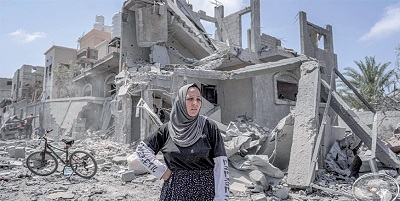 Israel presses on in Gaza as world awaits reaction to Iran attack
Israel presses on in Gaza as world awaits reaction to Iran attack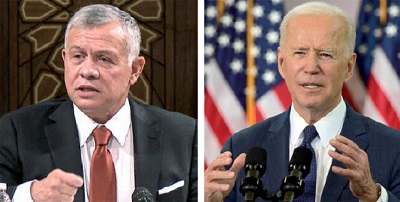 King, Biden discuss regional de-escalation, need to reach Gaza ceasefire
King, Biden discuss regional de-escalation, need to reach Gaza ceasefire
Most Read Articles
- King, Biden discuss regional de-escalation, need to reach Gaza ceasefire
- Safadi says Israel behind increasing regional tension, warns of Gaza war spillover risk
- World urges restraint after unprecedented Iran attack on Israel
- Cassation Court upholds four years prison term for drug dealer
- Gov’t affirms readiness to deal with any threats to Jordan's safety, security
- France summons Iranian ambassador over strikes against “Israel”
- Amman develops into centre for Arabic language learning
- King receives invitation from Azeri president to attend COP29
- Israeli Occupation Forces release detainees from Gaza Strip amid ongoing aggression
- Navigating Jordan’s sustainable development challenges - By Asyaf Nasser Al Zaben, The Jordan Times